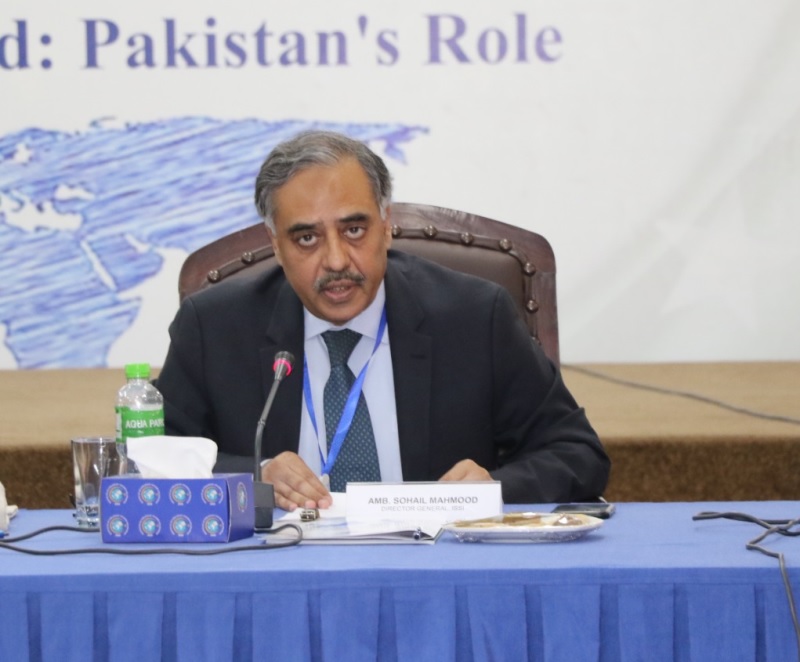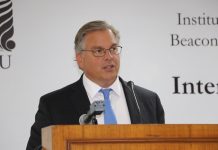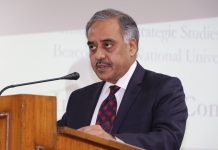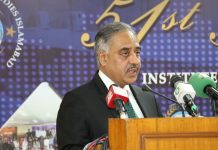Remarks by DG ISSI Ambassador Sohail Mahmood at ISSI-USIP
International Conference on
“Navigating Peace & Security in the Region and Beyond: Pakistan’s Role”, ISSI
5 October 2023

Ambassador Khalid Mahmood, Chairman BoG ISSI,
Ambassador Asif Durrani, Special Representative for Afghanistan,
Excellencies,
Distinguished participants.
Assalam-o-Alaikum and Good Morning!
It is a distinct privilege to welcome all the distinguished participants and honoured guests to this Inaugural Session of our 2-day International Conference.
We are particularly grateful to the participants who have travelled long distances to be with us in-person. Equally, we value the participation of those scholars, experts and practitioners who have joined us from Islamabad and other cities in Pakistan and all those who would be joining on-line from various parts of the world.
We are happy to welcome Dr. Andrew Wilder from USIP. His personal participation is highly appreciated.
We are also immensely pleased to welcome an eminent colleague and dear friend, Ambassador Asif Durrani, as the Chief Guest. Ambassador Durrani’s long-standing diplomatic experience and his deep knowledge of Pakistan’s engagement with its key adjoining regions brings huge value to our deliberations.
I also wish to place on record our sincere thanks to our partner in this enterprise, the United States Institute for Peace (USIP). The ISSI’s relationship and mutually-beneficially collaboration with USIP goes back a long time. The USIP’s Washington and Islamabad offices have worked closely with our CAMEA Team to bring together a formidable group of speakers for the various Working Sessions of the Conference. We are grateful for their tireless efforts.
Distinguished participants,
This Conference, focusing on Pakistan’s role in navigating peace and security in the region and beyond, is timely. Amidst the flux and uncertainty that characterises the world today, any effort that helps bring some strategic clarity and promotes the cause of stability is indeed welcome. The prognoses and prescriptions presented during the Conference would surely contribute in that direction.
From our vantage point at the ISSI, I wish to share some observations in three areas.
First, the state of the world has never been this fragile, polarised and fractured in all the decades since the end of the Second World War. The proliferation and accentuation of traditional and non-traditional security threats has injected an extremely high level of volatility into the global environment and increased the risks of conflict that could even assume nuclear dimensions. The significance of the Bulletin of Atomic Scientists setting the so-called “Doomsday Clock” at 90 seconds to midnight should not be lost on anyone. We all know that this is the closest to global catastrophe that it has ever been. The stakes could not be higher.
Specifically, today we see deepening major-power competition, a raging war, simmering military conflicts, trans-national terrorism, adverse effects of a pandemic which has not completely ended, global economic downturn, long-standing unresolved disputes, a looming population explosion, unregulated growth and militarisation of new emerging technologies, and the existential threat of climate change. This list is only illustrative, not exhaustive.
Concurrently, we see weakening of the commitment to international law, erosion of international cooperation and solidarity, attempts to discredit multilateralism, predictions about potential demise of globalization, reversals in the realization of SDGs, weaponization of economic tools, mainstreaming of right-wing extremism in many societies, shrinking of democratic space and growth in hate speech, and an alarming rise in the pernicious phenomenon of Islamophobia.
This combustible mix, or the ‘witch’s brew’ if you will, directly undermines the prospects of stable peace and security at the international and regional levels. For nations seeking a peaceful external environment to focus on their internal consolidation and development goals, the challenge could not be more formidable.
Second, the process of change and transformation at the global and regional levels is becoming deeper and more profound.
In a recent wide-ranging address at the John Hopkins School of Advanced International Studies (SAIS), Secretary of State Antony Blinken stated in categoric terms that we are at “another hinge moment in history.” He added, again in quite certain terms, “one era is ending, a new era is beginning.” Stressing that the decisions made now will shape the future for decades to come, Secretary Blinken outlined the overall U.S. strategy for this “pivotal period.”
Earlier, we had heard President Xi Jinping say that “we are witnessing once in a century changes in the world.” Similarly, German Chancellor Scholz has spoken of the world facing the ‘Global Zeitenwende’ – or an “epochal tectonic shift.”
At this moment, quite obviously, it is difficult to accurately measure the full scope and breadth of the transformation underway. For instance, it is hard to tell whether we will actually see the predicted decline of the West and the projected ‘rise of the rest’, the demise of globalization or its re-birth in a different incarnation, a repudiation of economic inter-dependence or a realistic acceptance of this imperative, the division of the world in opposite camps and a new round of cold war, and a redistribution of power in the global order or retention of the existing global structure with its own defined international norms.
Yet, some things are also quite clear: the centre of gravity is shifting to the East, the yearning for a multipolar world is widely shared across the globe, the developing world or ‘Global South’ with increasing ambition has become a reality, so-called ‘mini-lateralism’ with focus on smaller, issue-based coalitions is becoming a stronger trend, and the quest for semblance of predictability and stability is common to most of the nations.
In the regional context, while the post-U.S. Afghanistan is still beset with security threats and other serious challenges, the grand rapprochement between Iran and Saudi Arabia brokered by China appears to be having a cascade effect across the region. A large part of the Middle East is imbued with a reform spirit which is nearly revolutionizing the geostrategic and economic landscape. Green transition, trade and investment, and connectivity are the key drivers of the change sweeping the region.
Sadly, however, South Asia remains mired in history and the bitter past, unable to move towards any reconciliation, peaceful resolution of disputes, or meaningful regional cooperation, connectivity, and economic integration. The dangerous impulses of ‘Hindutva’ ideology are shaking the foundations internally in India and increasing the risks for peace and security in the region. There could not be a sharper contrast with a dynamically changing world and a static, rather regressive South Asia.
Third, Pakistan must navigate this complex and rapidly transforming global and regional environment and make its way forward. A country of 240 million enterprising people, located at the cross-roads of three strategic regions, a leading nation in the Muslim world, and a nuclear power — Pakistan is a pivotal state in its own right. As a middle power, Pakistan has both the potential and the possibility of making a hugely positive contribution to regional and international peace, security and prosperity.
In the face of prevailing global dynamics and emerging trends, as well as having a clear recognition of the challenges and opportunities before it, Pakistan’s task is clearly cut out: i.e. to manage the complicated geo-politics and accentuate the pivot to geo-economics. Among other things, this could be effectively managed with political stability, sustained economic growth, and a vigilant, nimble and innovative diplomacy.
Last but not the least, Pakistan and the United States have been longstanding friends and partners. In this changing milieu, it would be important to find new, stable anchors for the relationship that help advance Pakistan’s economic development goals and enable a positive contribution to peace and security at the regional and international level. This Conference would provide a platform for reflection on these questions and hopefully for finding some good answers.
With these thoughts, I welcome everyone again and wish fruitful deliberations through the various Working Sessions.















